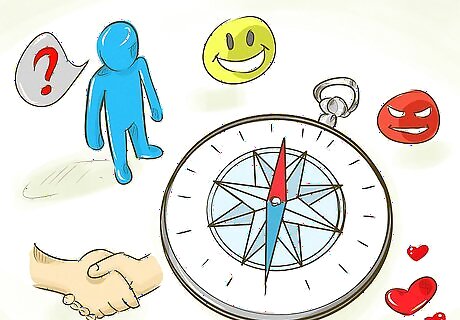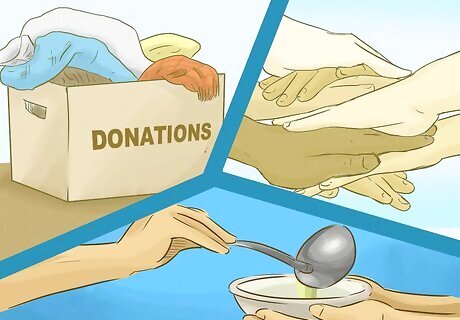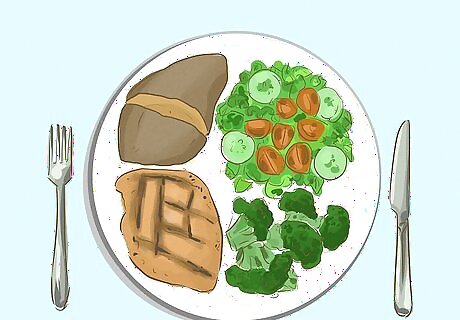
views
Emphasizing Your Life Desires

Make a list of what people or things matter to you. When looking for a life plan, it makes sense to prioritize some areas of your life. List all the things that you value in your life. You might list your family, friends, a certain hobby, nature, or career. Take the time to think deeply about the things without which you could not imagine living. For example, while you might like playing basketball, is this one of the most important things in your life? Perhaps it is. If not, it is likely a hobby.

Determine your core values. You have your own moral compass, which guides you through life. What are the values you want your life to reflect? Do you strive to be honest? Perhaps you want to be caring and considerate towards others. Maybe you have a strong sense of social justice. Defining your values will help you determine your future actions. For example, if you prize honesty, there are some careers that might not be the best for you. CIA agents, for example, cannot disclose to others what they really do. On the other hand, if you care passionately about social justice, perhaps you could consider studying social work. For additional tips, see Live Life to the Fullest.

Find your calling. Every person has their own talents and strengths. Aim to live your life in reflection of your unique calling. Finding your calling does not mean following someone else’s path. Instead, seek to define what you do well and how you can live a life that incorporates your strength and perhaps helps other people as well. For example, you might be a talented teacher and musician. Perhaps your calling is to teach children piano lessons. On the other hand, you might be a great listener and care about helping others. You might be well-suited to be a psychologist. If dinosaur bones excite and fascinate you, perhaps your calling is paleontology and spreading knowledge about dinosaurs and environmental change to a new generation. Oprah Winfrey, Entertainment Mogul Design a meaningful life that you feel good about living. "The challenge of life, I have found, is to build a resume that doesn't simply tell a story about what you want to be, but that tells a story about who you want to be."

Name your goals. By making goals for life, we can live with a purpose. Do know that at any given time, your goals might change. You can adapt your goals as you move through life. If you have some structure, however, your life likely will be a bit easier. For example, you might want to become a physician. Your mini goals could be attending college, gaining entrance to medical school, graduating, and beginning to practice medicine. Each of these goals will have sub-goals. If your goal, on the other hand, is to have children, first you should think about how you want to have them. Do you want a partner with whom you can raise them? Do you prefer to adopt? What are the different strategies you can pursue to fulfill this goal?

Prioritize. After you have ascertained the people who matter to you, your values, and your goals, create priorities. At different points in life, you might prioritize different aspects. For example, while in school, your studies might take precedence. Later, your relationship or children might take more of your focus. By keeping your priorities in mind, you can better schedule your life. See Prioritize for additional tips.
Living In the Company of Others

Build strong relationships with close ones. Take the time to build solid relationships with the people about whom you care. Listen to their problems. Help them when necessary. When you offend them, apologize and strive to do better. Practice kind gestures like giving people rides or birthday cards. See Have a Healthy Relationship for more advice. Additionally, practice these behaviors: Build a circle of trust. Make sure your family members and friends know they can share their thoughts openly with you. Do not tell other people's secrets. If someone asks you to keep a confidence, do so. Be compassionate towards others. Even if someone wrongs you, if they are sincere in their repentance, show them forgiveness. Do not bring up their past transgressions in moments of anger.

Promote healthy communication. Be direct when speaking to others. Listen carefully and attentively. If you have disagreements, try to fight effectively. That is, do not call each other names. Instead, discuss your problems calmly. Make sure you listen to the other person's point of view. For example, it might be wise during arguments to repeat the other person's point of view. This shows you understand. You might say, "What I'm hearing you say is that you are annoyed by the fact that I am always home so late." Ask rather than assume. If you feel a relationship is suffering in some way, talk to the other person openly and candidly.

Be a good neighbor. Part of living a good life comes from building a tight-knit local network. If you have neighbors, be helpful to them. Watch their cat when they go on vacation. Offer to shovel an elderly neighbor’s driveway. Practice neighborliness and you might find it is contagious.

Serve your community. One way to live a good life is to contribute to the community in which you live. You might volunteer at a soup kitchen or run a clothes drive for refugees. Ask your local government representatives or religious organizations for tips on which causes could use help. You also could plan a fundraiser for a cause in the global community.
Enjoying Life

Travel. See what there is to see in the world around you. Explore new areas in your neighborhood or town or if your budget allows, travel farther. There is no way we can visit every place in our lifetime. We can create awareness and develop empathy by traveling to other places, though.

Practice hobbies. In addition to your calling and life purpose, you also need to have plain fun! Find hobbies that interest you and incorporate them into your routine. For example, you might join a knitting group or start rock climbing. By doing hobbies, you also will meet more people and have a more fulfilled life. See Find a Hobby.

Aim to eat healthy foods. Eat fresh fruits and vegetables and look for whole-grain pastas and breads. Incorporate more poultry and fish into your diet (unless you’re vegetarian). Beans, nuts, and eggs also offer you good nutrition. Do not overdo your sodium, carbohydrate, or saturated fat intakes. Drink 9 cups of fluids per day if you are female and 13 cups a day if you are male.

Exercise moderately. Try to incorporate 2.5 hours of moderate or 1.25 hours of strenuous cardio exercise per week. To strengthen your muscles, lift twice a week. By exercising regularly, you likely will lead a longer and healthier life. Your heart, muscles, and bones will all benefit. Moderate exercise could be walking, yoga, dancing, or swimming. Strenuous exercise could be running or doing a spin class.

Tap into your spirituality. Whether or not you follow a particular religion, find what gives you meaning in your life. Why are you on earth? What nurtures your soul? Particularly when you face difficult moments in life, practicing spirituality can help you cope. Being spiritual also helps you forgive others. Prayer and meditation can help you relax and refocus. Having a community built around spirituality or religion can support you when you are in need.
Being Grateful for Life

Contemplate gratitude. Every day, when you wake up, express three things for which you are grateful. Perhaps you have a job you love. Maybe you have a very supportive partner. You might have no illnesses. Always taking a moment to reflect on the things for which you are grateful can be very helpful. See Express Gratitude for ideas on how to express your gratitude to others. Practice counting your blessings before bedtime by journalling about three positive moments from your day. Contemplate why these moments occurred and what actions of yours did or did not lead to them. EXPERT TIP Adam Dorsay, PsyD Adam Dorsay, PsyD Licensed Psychologist & TEDx Speaker Dr. Adam Dorsay is a licensed psychologist in private practice in San Jose, CA, and the co-creator of Project Reciprocity, an international program at Facebook's Headquarters, and a consultant with Digital Ocean’s Safety Team. He specializes in assisting high-achieving adults with relationship issues, stress reduction, anxiety, and attaining more happiness in their lives. In 2016 he gave a well-watched TEDx talk about men and emotions. Dr. Dorsay has a M.A. in Counseling from Santa Clara University and received his doctorate in Clinical Psychology in 2008. Adam Dorsay, PsyD Adam Dorsay, PsyD Licensed Psychologist & TEDx Speaker Gratitude helps us become less depressed, less anxious, happier, and more attractive to be around. This is actually supported by neuroscience. We've seen in MRIs the effects of gratitude. We have hard evidence that certain parts of the brain are bolstered when we engage in daily gratitude practices.

Keep problems relative. Part of living a good life is not getting wrapped up in the daily problems we all face. While it is important to Handle Problems, take a moment to think about what is going well in your world. Perhaps you saw someone escort an elderly lady across the street. Maybe the children at your local school are collecting food for the homeless. Do you still have your health? Are you not penniless? Do you still have loved ones? Though you might be missing some of these things, keeping your problems in a relative position is helpful.

Get outside. One way to be grateful for life and to enjoy life is to engage with nature. Ride your bike along the river or take a walk in the forest. Listen carefully for the different animals’ and insects’ noises. Smell the plants or fresh rain. The world is filled with amazing attributes. Take a moment to let it sink in. Consider taking a reflective, multi-sensory walk in which you do not focus on any technology. Rather, look around you, notice different buildings or trees in your environment. Focus on the smells coming from a bakery or fresh-cut grass. Listen to people's voices or the wind in the trees. Reflect deeply to define your purpose. "I was just going through the motions each day, feeling aimless. This article led me to really think about what matters most. I realized teaching children is my passion. Now, I'm taking steps to become a teacher — I feel motivated again! Defining my purpose has been life-changing." - Nayara J. Build a circle of trust with loved ones. "My friendships felt superficial until I read this. I started opening up more, listening better when people confide in me. I don't gossip or break confidences now. My bonds feel much deeper after focusing on trust." - David A. Contribute your skills to the community. "I felt disconnected from my neighborhood before. But volunteering at a local homeless shelter, like the article suggested, changed that. I help with their budgets and paperwork. Meeting incredible people there gives me purpose. Serving others enriched my life." - Rana S. Appreciate simple joys through nature. "Stress had me missing out on life's little pleasures. Taking mindful nature walks now reminds me to appreciate things like birdsong and flower scents. Pausing to notice the beauty around me fills me with gratitude. This article really helped shift my mindset." - Samantha H. Have a story our readers should hear? Share it with 1 billion+ annual wikiHow users. Tell us your story here.

Abstain from pleasurable activities temporarily. Sometimes to appreciate the good things we have in life, we need to take a pause from them. The pause could be a week or a month. When we return to our activities, we are more likely to realize how lucky we are to have them. For example, perhaps you have a pumpkin latte every day in October. Try taking a week off. You will appreciate the drink and its impact on your happiness even more.




















Comments
0 comment